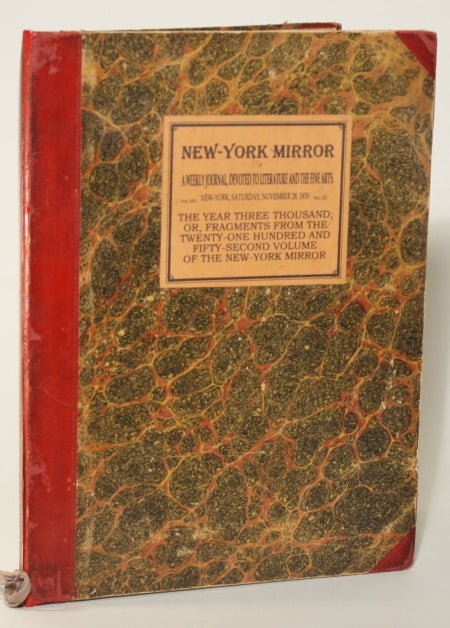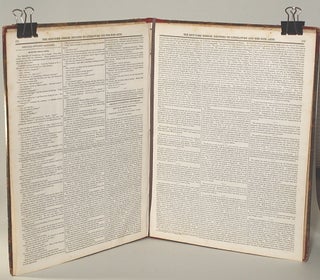New York: New-York Mirror, Saturday, November 28, 1835 (volume 13, number 22). Folio, 8 leaves (pp. [169]-176), single issue, extracted and sewn (with linen tie) into a nineteenth-century three-quarter red leather and marbled boards portfolio with a modern printed title label affixed to front board. Includes "The Year Three Thousand; or, Fragments from the Twenty-one Hundred and Fifty-second Volume of the NEW-YORK MIRROR," a four-column piece signed "V. E. P. U. V." "A futuristic glimpse at New York a millennium hence. The view seems optimistic at first, due to technological and ethical improvements. The new air-equipage of Mr. Douvine 'crosses the Atlantick ocean in less than a week' and its 'propelling machinery, (which requires only winding up once in twenty-four hours), works against the wind without difficulty or danger.' War has been rendered obsolete by the 'machine of Mr. Bartlett, by the breath of which, an army of a million men may be destroyed in an hour… There is now no arbiter between nations, but moral feeling.' The attentive reader may feel a faint unease with the growing realization that he is at the mercy of a remarkably flat-footed imagination -- unless, in fact, it's a remarkably dead-pan satire. Perhaps the real subject matter of this four-column exercise is not the city of the future but the literature of the present. The author skewers hero-worship by positing the existence of some future giants the mere mention of whose names is meant to elicit the reader's awe at some unspecified accomplishment. This hits out at the reconstruction of the past as much as the construction of the future, at naïve historians as well as naïve utopians, at faulty rhetoric as much as faulty logic and ethics. The parodic intent of the piece is finally stripped of disguise in the article's closing lines. 'What a prodigious change the last thousand years has made! The republick of America has given to the world a Hopson, a Benfield, a Nosard. What did Greece? what did Rome? [etc.]' Presenting a future that is all sizzle and no steak constitutes an elegant mockery of the passion for progress. The MIRROR's audience, who surely knew the etymology of 'utopia,' would have gotten the joke in the next sentences, which answer these apparently rhetorical questions. Where else did civilization reach such heights as those posited here with such blithe vagueness? 'No where. We unhesitatingly respond, no where!' A remarkable exercise, attacking utopian rhetoric not by offering a contrary view of the future as decay, but by attacking the notion of significant change of any kind. Can be seen as a counterweight to Mary Griffith's important (and earnestly utopian) 'Three Hundred Years Hence,' published in CAMPERDOWN in 1836 (but possibly with an earlier periodical appearance)." - Robert Eldridge. Several mild fox marks, else a fine copy. The portfolio has a few scuffs at edges. (#130758).
Price: $1,250.00
No statement of printing.




